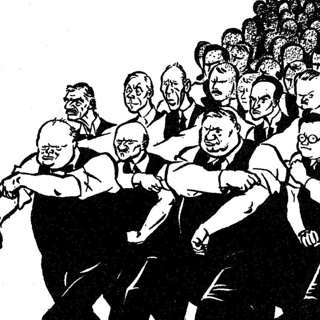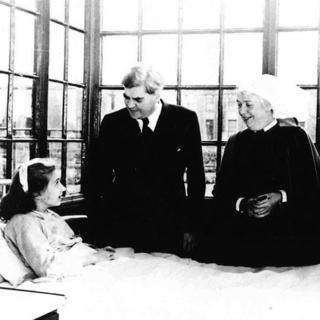
235. Clem against the Evil Giants
In the July 1945 general election, the British public offered Winston Churchill, as he put it himself, the ‘order of the boot’. A victorious war Prime Minister was kicked out. In his place, his deputy, the Labour leader Clem Attlee became Prime Minister.There was massive enthusiasm for the Attlee government in the working class, which extended to many soldiers. These were the people let down after the First World War when the promise of a ‘Land fit for Heroes’ was betrayed. They, and the government they elected, weren’t going to let that happen again.But does that mean that the Attlee government was socialist? In this episode, we study the social reforms it introduced and how they built on advances made by earlier radicals, many of whom were not socialist. In particular, the principal inspiration for those reforms came from William Beveridge, author of the Beveridge Report. Far from being a socialist, he was a Liberal, even briefly a Liberal MP.He'd identified five giant evils, want, ignorance, squalor, disease and idleness. This episode looks at the reforms designed to address the first four of these. The fifth, idleness, we’ll return to later.Illustration: Nye Bevan talking to a patient in Park Hospital, Trafford, Manchester, on the first day of the NHS, 5 July 1948. Image: Trafford Healthcare NHS/PA WireMusic: Bach Partita #2c by J Bu licensed under an Attribution-NonCommercial-No Derivatives (aka Music Sharing) 3.0 International License
16 Maalis 14min
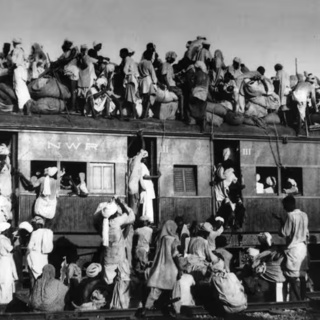
234. Fall of an iron curtain and of a jewel from the crown
It was a strange world that emerged from the Second World War.Both genocide and the mass killing of civilians, above all through bombing, culminating with the A-bombs dropped on Japan, had become somehow normalised. They rather weaken the case of the developed nations, which made these things happen, denouncing ethnic cleansing and terrorist bombs when they happen again today.The Soviet Union had massively extended its control of territory and what Churchill called an ‘iron curtain’ had as a result descended across Europe, dividing the continent in two.As for Britain, it had emerged broke, a condition it might have hoped the US would help with, discovering with some shock that actually the aid that flowed in under lend-lease would be stopping far more quickly than expected. Instead, the British government would have to negotiate a loan, which it finally paid off sixty years later.As for its imperial role, the Empire was beginning to fall apart. The major step was the independence of India, something on which the new Prime Minister, Clement Attlee, had been keen for a long time. Sadly, it was done too quickly and botched, amongst massive violence and bitterness, especially with the partition of India to allow the creation of Muslim Pakistan. The violence and pain continued to decades, with wars and genocidal actions, not just in India and Pakistan but also in the other parts of the British Indian empire, Burma (Myanmar) and Ceylon (Sri Lanka). That rather leads to the question, might it not have been better had Britain never set out to rule India in the first place?Illustration: Muslim refugees attempting to flee India sit on the roof of an overcrowded train near Delhi in September 1947. From The Guardian. Photograph: APMusic: Bach Partita #2c by J Bu licensed under an Attribution-NonCommercial-No Derivatives (aka Music Sharing) 3.0 International License
9 Maalis 14min

233. Shocks and surprises at the war’s end
Following the German surrender in May 1945, the ‘Big Three’ – the United States, the Soviet Union and Britain – met for the third and last time in conference. And this time, appropriately, they met on German territory, in Potsdam near Berlin. It was Soviet-held territory too, perhaps significant given the power with which the Soviet Union was emerging from the war.Indeed, its delegation was the only one to keep the same leader, Joseph Stalin, at its head, as he had been at Tehran and Yalta. Roosevelt had died. As for the British, after nearly ten years without a general election, they finally held one, and to general surprise, the victorious war Prime Minister Churchill was defeated by his deputy, Clement Attlee, the Labour leader. Attlee would form the first ever Labour government with a parliamentary majority. He would also take over from Churchill as leader of the British delegation at Potsdam.The conference took place under the shadow of the first successful test of a nuclear device, the day before the conference started. The US was now a nuclear power. That gave it quite an edge in international power politics.Although the device had been designed to use against Nazi Germany, since only Japan was left in the war, and given how high the casualties would be in an invasion of the Japanese home islands, the Americans dropped an atom bomb on Hiroshima on 6 August 1945. To make sure the message had got through, they dropped another on Nagasaki on the 9th. The Japanese surrendered on the 15th, the only concession to their sensibilities being that the Emperor was not deposed. When the final Japanese surrender document was signed on 2 September, World War 2 was at last over. Illustration: The A-bomb dome in Hiroshima, Japan. Public DomainMusic: Bach Partita #2c by J Bu licensed under an Attribution-NonCommercial-No Derivatives (aka Music Sharing) 3.0 International License
2 Maalis 14min
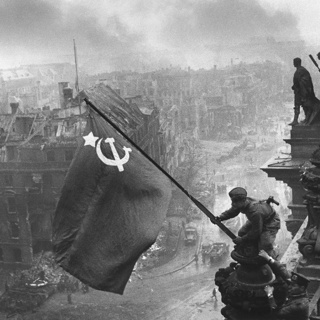
232. Bickering allies win in Europe
At the Yalta conference, between the US, the Soviet Union and Britain, the tensions between the Allies became increasingly obvious. Representing Britain, Churchill wanted the Allies’ war effort to be directed in such a way as to limit Soviet control over Central and Eastern Europe. The Soviets wanted to make sure they maximised the area they controlled. And given how powerfully they were surging towards Germany, it was hard to see how they could be blocked. Certainly, the Americans saw no way to stop them and weren’t prepared to go along with Churchill’s schemes for trying.The result was that the Soviets ended up completely controlling such nations as Poland and Czechoslovakia, and several other countries of Eastern Europe. They also got to Berlin first and symbolically planted a Soviet flag on top of the German Reichstag (parliament) building. With Hitler committing suicide while Soviet forces were only 500 metres away, this meant that when the Nazis surrendered on 8 May (to the western powers) or 9 May (to all the Allies including the Soviets), Stalin was in a powerful position among the victors.Illustration: A Soviet soldier plants a flag on the Reichstag building in Berlin. Public DomainMusic: Bach Partita #2c by J Bu licensed under an Attribution-NonCommercial-No Derivatives (aka Music Sharing) 3.0 International License
23 Helmi 14min
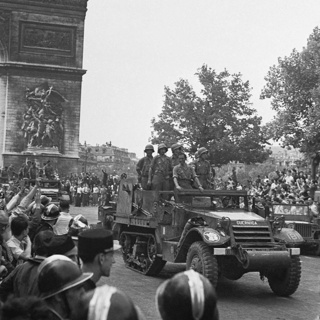
231. Nazis facing defeat
By the time of the Yalta conference in February 1945, between the USA, Soviet Union and Britain, the latter still being treated as a great power though its decline was already clear, there could be little doubt that the war in the west, at least, was heading towards victory for the Allies.The Soviets were sweeping through eastern Europe and were only 65 km from Berlin.The D-day landings had gone well, in great part thanks to the brilliant planning work of Admiral Bertram Ramsay, and since then – despite a few setbacks, at least two of the more serious down to Bernard Montgomery – the America and British armies had swept through northern France, liberating Paris, and then Belgium. Meanwhile, another landing, this time by American and French troops, in the south of France had added further momentum to the advance.The war was drawing to its end. The main leaders of the Allies came to Yalta to discuss what happened to Europe next, once peace had been secured. The decisions we’ll talk about next week, but for now it was clear that all the Allied sides would be negotiating from positions of strength.Illustration: Driving down the Champs Elysées of newly liberated Paris, with the Arc de Triomphe behind, on 26 August 1945, the halftrack ‘Guernica’ from the Ninth Company – La Nueve – manned by exiled republican veterans of Spain’s civil war, from Philippe Leclerc’s Deuxième DB. Public DomainMusic: Bach Partita #2c by J Bu licensed under an Attribution-NonCommercial-No Derivatives (aka Music Sharing) 3.0 International License
16 Helmi 14min
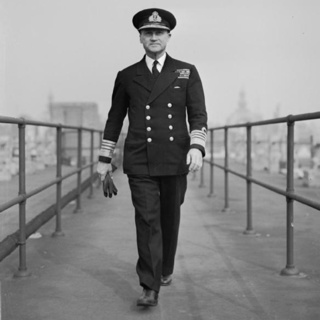
230. From Husky to Overlord, Sicily to the D-Day beaches
In 1943, Britain didn’t feel the Western Allies were ready yet for an invasion of France, and with its influence at the highest point it ever reached, it was able to persuade the Americans reluctantly to postpone it for the moment. Instead, they went for an invasion of Sicily, which went well overall, though with significant casualties. Bertram Ramsay, who’d handled the Dunkirk Evacuation so well, commanded the naval forces and learned some invaluable lessons about this kind of combined operation.The Allies moved onto the Italian mainland next, and after overthrowing Mussolini, the government there surrendered. Mussolini, rescued by the Germans from captivity, was set up ruling a rump and unpleasant republic in the north of Italy, and the fighting continued.The Americans, though, now finally decided that enough was enough and that preparations had to be made for the French invasion. Stalin couldn’t agree more, when the USA, Britain and the Soviet Union met in Tehran. Oddly, the Americans accepted Stalin’s invitation to accommodation, which meant that every word they said was heard by the Soviets.The agreement was for an invasion in May 1944. There were a few obstacles on the way, but in the end it went ahead only slightly delayed, on the 6th of June.D-day! We’ve finally got there. And Allied troops were once more back on French soil.Illustration: 1944 Royal Navy official photo of Admiral Bertram Ramsay, Naval Commander during both Operation Husky and Operation Overlord. Public DomainMusic: Bach Partita #2c by J Bu licensed under an Attribution-NonCommercial-No Derivatives (aka Music Sharing) 3.0 International License
9 Helmi 14min
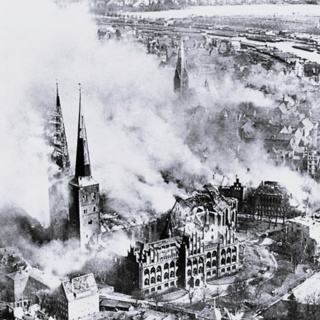
229. The tide turns
The tide turned against the Axis and in favour of the Allies in the course of 1943. Victories at Stalingrad in Russia, in the Battle of the Atlantic, and in North Africa, came on top of American advances in the Pacific, from island to island towards Japan. That relieved some of the pressure on the British government, that had been coming under fire for the all the disasters of 1942: the shipping losses in the Battle of the Atlantic, the loss of Burma and Malaya culminating in the fall of Singapore, and the Eighth Army’s retreat in front of Rommel in North Africa. Within the British government, things had changed since the start of the war, with the Conservatives Chamberlain and Halifax gone, as well as the poorly performing Labour Deputy Leader, Arthur Greenwood. Churchill and Attlee, so different in personality, had found an effective working relationship, with Attlee now officially Churchill’s deputy, and deeply loyal to him. Attlee supported his boss on the big questions, such as the strategic bombing campaign against Germany, now considerably stepped up with the arrival of the Americans. That campaign was increasingly targeting civilians, making it arguably a war crime, or even simply terrorism, but it continued even though it never achieved its aim of breaking German morale. What it did do is divert a significant amount of German airpower from the Russian front to German home defence. The North African campaign had a similar effect: small scale though it was, it sucked in German troops who might otherwise have fought in Russia, and it cost the Luftwaffe dearly, helping the Soviets gain air superiority on the Eastern Front, as the Brits and the Americans won it in the West. Where Attlee differed from Churchill was over questions such as India. A terrible new famine in Bengal, handled with callousness by Churchill, ensured that the question of Indian independence remained a burning one. Attlee was also under pressure from his own party, with Labour demanding that the government adopt as immediate policy the Beveridge report, proposing major reforms to ensure the poor and workers emerged better off when Britain reconstructed itself after the war. Attlee resisted the pressure, since he felt that it was important to hold the Churchill government together, making only small changes until it had won the war, and saving the major reforms for peacetime. Illustration: The Cathedral of Lübeck in Germany burning after an air raid in 1942. Bundesarchiv Bild 146-1977-047-16, released for free public use. Music: Bach Partita #2c by J Bu licensed under an Attribution-NonCommercial-No Derivatives (aka Music Sharing) 3.0 International License
2 Helmi 14min
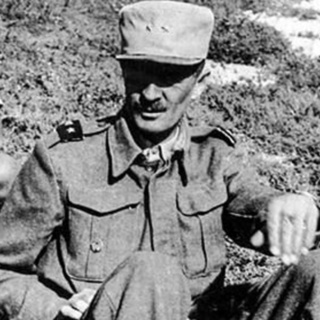
228. Turning points: 1943
This is an episode for turning points. The year’s 1943. The Battle of Stalingrad, where the unstoppable German offensive into Russia was finally stopped and turned around, with Soviet forces essentially fighting forwards to the two remaining, and grim years, of their war with the Nazis. The Battle of the Atlantic reached a peak where Britain looked as though it might actually lose not just that battle but the whole war, when a number of vital technical developments and the release, at last, of some more resources for convoy protection, at last gave them the edge over the U-boats. The man who replaced Auchinleck at the head of the British Eighth Army in North Africa, Bernard Montgomery, though always so cautious that he consistently failed to take advantage of any victory, nonetheless took credit for defeating Rommel because he was in charge at the Second Battle of El Alamein when that success was secured. With hindsight, it’s clear that credit should in large part go to Auchinleck for the First Battle which laid the ground for the Second. With Operation Torch landing US and British troops in Morocco and Algeria, the Axis forces were caught in a pincer between them advancing eastward and the Eighth army pushing them westward. They finally surrendered on 13 May 1943. In the meantime, there’d been an ugly quarrel among the French about who should lead the newly liberated territories. Eventually, it would be won by de Gaulle, deservedly, but that was by no means obvious from the start. Finally, the episode gives a little insight into the character of a remarkable Free French general, Philippe de Leclerc, and one unit that came under his command, the Ninth Company of his Second Armoured Division, made up of exiled Republican veterans of Spain’s Civil War. We’ll be hearing about it, and about him. Illustration: Philippe Leclerc, the Free French general who never compromised with the collaborationist Vichy regime. Music: Bach Partita #2c by J Bu licensed under an Attribution-NonCommercial-No Derivatives (aka Music Sharing) 3.0 International License
26 Tammi 14min
